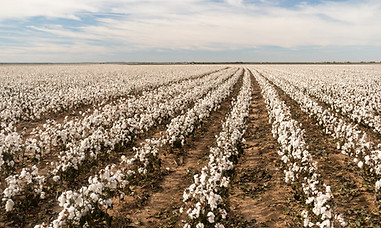SUSTAINABILITY WITHIN THE FASHION INDUSTRY

It's NEVER been more important that we all take personal accountability for our consumption and our actions regarding the use of natural resources.
The fashion industry has historically been a terrible polluter, but things are changing rapidly from the grass roots level. Smaller, agile businesses like Hey Lola are taking the lead and showing larger companies the way forward.
We thought we should give you an insight into what Hey Lola is doing to negate the murky past of our industry and how we source and operate our business in the most planet-friendly way possible.
Hey Lola has our environment at the heart of everything we do. We share profits with charities to care for the people around us but we also care for the planet greatly too.
We always say we are committed to Greener Fashion for a Better Planet - but what does that actually mean?
1. Our Products: Environmentally Better Cotton
We purchase our cotton products from manufacturers who subscribe to the Better Cotton Initiative wherever possible.
What is the Better Cotton Initiative? Read more here.
Where we can’t purchase garments from BCI-affiliated manufacturers, we demand that they are at least certified by WRAP (Worldwide Responsible Accredited Production).
Being WRAP accredited means that our manufacturers monitor every step of the entire manufacturing process, from seed-germination to yarn to garment. Our suppliers implement regular independent checking within their production sites. They also subscribe to other certifications that prove long-term commitment to the environment and the people involved in the production from cotton-grain to garment (BSCI, Sedex, OEKO TEX, FAIR WEAR, ISO, REACH, ORGANIC 100, etc.).
As well as being environmentally and socially responsibly manufactured, all of our garments are also officially recognised as 100% free of any animal ingredients and are PETA-approved.
It is our aim over the next 3 years to purchase 100% BCI cotton products and our manufacturers are working towards this goal with us.



2. Wastage:
Unlike most other companies, we send our leftover base materials FREE to UK-based community projects; schools, women’s refuges and other charities who use any leftovers we have, to create other products.
A finished garment that doesn’t meet our very high standards or is faulty is either:
-
Repaired by our in-house seamstress and donated to charity
-
Sold as a ‘Second’ in our sale
-
Sent back to the manufacturer for identification of a batch fault
No garments are put into landfill.
3. Travel and Day to Day
Our company vehicle - used to drive between our two workshops, to meetings, manufacturers, deliver parcels to depots when they’re not picked up from our premises etc - is fully electric.

4. Packaging: Paper, Compostable and Recyclable Only From Day 1
We have only EVER used paper packaging and we only ever will. Even our ‘plastic’ garment bags are compostable. They’re not plastic at all and are made from cane-sugar derivatives. Even our sparingly-used sellotape is recycled and recyclable.
When it comes to paper and cardboard, there are a lot of myths around. Two Sides is a not-for-profit group that investigate, educate and communicate about ecological issues surrounding paper (and print).
One worrying myth about paper production is that it’s a major cause of deforestation and that European woodland is being destroyed as a result. In fact, European forests grew by an area equivalent to 1,500 football pitches every day between 2005 and 2020. Our paper products are all sourced from within Europe. Not only does this keep travel-related emissions down, it also ensures that the manufacturing is sustainably managed and is not borne of any deforestation.
Another misconception is that paper and cardboard production produces a large carbon footprint. In truth, the industry is one of the lowest emitters of greenhouse gases and managed to reduce emissions by a quarter in the twelve years leading up to 2017.
In Summary
We hope that you can see that we take the wellbeing of the environment very seriously indeed. It’s in everything that we do, it’s always been front of mind from Day 1 and it always will be.




